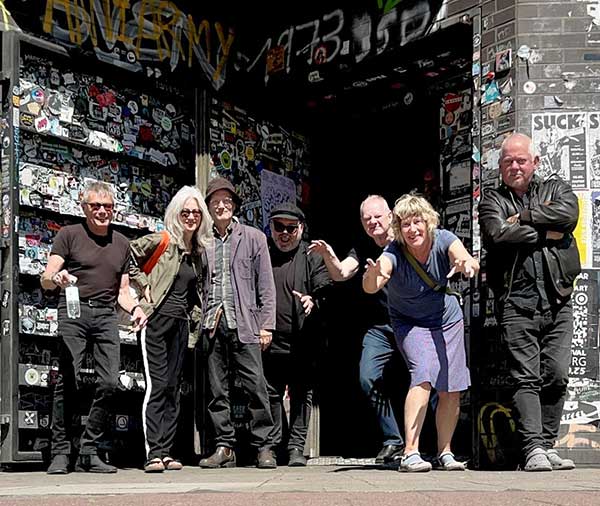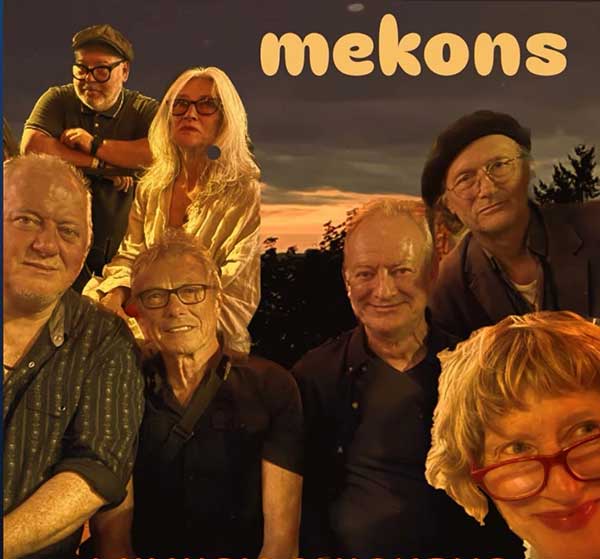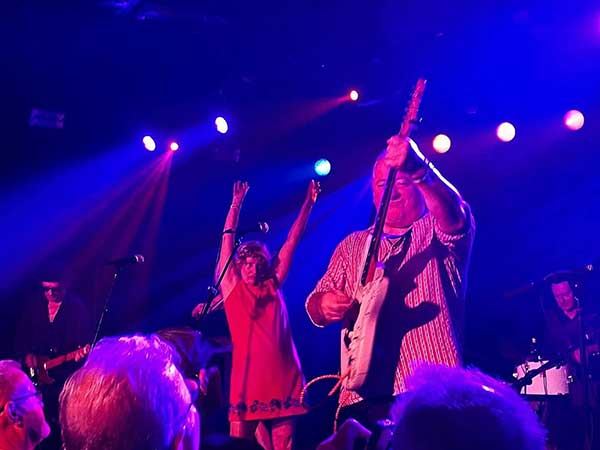
Despite the passage of time, there are still songs of the past ‘You’re Not Singing Anymore’. Can we still talk about what’s happening here? Are we still singing ‘Never Been In A Riot’? The 1977 Fast Products NME ‘Single Of The Week’ that kind-of extracts raw fun at the expense of The Clash ‘White Riot’? Some of us still sing along with the line about ‘I’m always in the toilet, pissing out the noise.’ Older than the internet. This is from a time when sound came in 45rpm vinyl editions.
I remember being at Abbey Road Studios… that is, Leeds Kirkstall Abbey Road, with Dutch Anarcho-Punks The Ex wandering in and around, as Jon Langford patiently explained to me how they’d made ‘Never Been In A Riot’, and how he’d expected that some magical process was involved in studio recording, and yet the single came out as grazed as an open wound.
‘It wasn’t called Abbey Road, it was ‘Offbeat’ on Abbey Road’ he corrects me now.
But the Mekons never talked about conquering America back then!

‘When Fear and Whuskey came out on our Sin label through Red Rhino in York, our mate Pete Thompson told us we’d sold out of the first pressing – mostly in the USA, so we had to go!’
For comic effect, he deliberately mispronounces Fear & Whiskey (1985, Sin Records SIN001). It’s the album that includes Leon Payne’s ‘Lost Highway’ – mistakenly attributed to Hank Williams in the credits, and it’s the album that features Pretty Things guitarist Dick Taylor on ‘Trouble Down South’. It was picked up in the States and issued as Quarterstick QS80CD, in which guise it sold very well indeed.
Older… but probably no wiser, that legendary postmodern, post-punk, post-human, but never past caring collective the Mekons have launched and toured a 2025 album – named Horror, it’s their debut for Fire Records. ‘Filled with kryptonite’ and rifted with cryptic signs. As always, it melds the personal with the political, while knowingly aware that the personal is also political. These Mekons are Jon Langford (guitar), Sally Timms (vocals), Tom Greenhalgh (mellotron), Dave Trumfio (guitar), Susie Honeyman (violin), Rico Bell (accordion, harmonica, Steve Goulding (drums), and Lu Edmonds (bass guitar).
Horror is made up in equal parts of history lessons about British imperialism and its legacy, with mashed-up lyrics set against their typically eclectic Mekonic sounds which draw on everything from Indie Rock ‘n’ Roll, Americana, Dub, Electronica noise and Punk, with side-glances at Music Hall and Polka. It even takes its partner for a waltz on ‘Sad And Sad And Sad’, with close harmony vocals, ‘a lack of tomorrows’ and with an attractive Folk-dance slapping glide towards the fade.

‘Yes, ask questions’ Jon invites.
Living in America, as you do now, do you ever get homesick for the delights of Leeds?
‘Not really’ says Sally Timms concisely.
‘Ahah!! I love Leeds,’ Jon breathes. ‘It was all dark and grim back in the seventies. Punk was an exciting, but not very comfortable or happy time for me. After ‘Mekons phase 1’ ended I went back to Art School and stayed there so I could enjoy the full flowering of the Goth scene, which was gentler. My band the Three Johns were not Goth but terminally adjacent, getting all our drum-machine tips from Andy (Eldritch) of the Sisters Of Mercy himself! I even played bass with them for a triumphant gig at York Uni back in 1982. Various family members drifted up to Yorkshire too. My Uncle Jim – a Cockney builder, bought a hotel in Burnsall, and through him I discovered the Yorkshire Dales. Then cousin Fred arrived, and we hit the dance floor! Leeds was much nicer by the time I left and even Leeds United FC had become a positive force, not a dank attractor for racists and thugs. I stayed in Leeds until I moved to the States in 1992. But I go back every so often, John Keenan – the promoter who booked the first Mekons show in 1977, has me back in Leeds solo at Northern Guitars on 19 November. The Northern Guitars shop & Music Bar on Call Lane is owned by Dave Baguley the Three Johns driver who is also one of the good guys.’
The roots of the Mekonic song structures, the global sound that reflects their nomadic journey through time and space from Leeds to California and all points beyond, is woven into the fabric of their songs… Mekons: Have band, will travel…
Has America lived up to your Rock ‘n’ Roll dreams? I remember how the first time I went to New York, it already seemed familiar because I’d seen so much of it in movies and on TV.
‘I don’t have Rock ‘n’ Roll dreams’ asserts Sally firmly.
You must have had Pop Stars blu-tacked to your bedroom wall when you were a teenager?
‘Mick Ronson and David Bowie’ she admits.
What kind of audiences come to a Mekons gig in America?
‘Audience are people out there in the world we might still want to meet’ says Sally, ‘to paraphrase Greil Marcus.’
‘Older nice people’ says Jon. ‘And some surprisingly young people on this tour! People in Gang of Four T-shirts. Rock critics. There are some people who like to travel to three or more shows!’
The album casts off with ‘The Western Design’. Sometimes, those lazy skanking reggae shots fail when played by white bands, even with Susie Honeyman’s violin drawing high lines above the rhythms. The song is a history lesson about the ‘brutal men, sick and untrained’ who set out at the red dawn of empire, as the song tracks the 1654 fleet as it leaves Portsmouth on a mission to expand England’s imperial ambitions. While taking in John Dee with his necromancing ‘scrying mirror’, the voyage lays the seeds of ‘a giant Frankenstein’ that leads to four-hundred years of stealing. Yet, acting as Devil’s Advocate, would there even be reggae without that Western colonial expansion…? and isn’t a white band playing reggae rhythms a form of cultural appropriation?
‘I have no idea where to start answering that’ Jon admits. ‘Reggae was the soundtrack of the British inner City – the Specials as cultural appropriation? I don’t think so. I’ve found music most interesting where borders are broken down.’ He pauses, ‘I got told I wasn’t hillbilly enough to play country music too…! Then Lee Scratch Perry was coming to Chicago to record a Country Album with my band the Waco Brothers after me and Steve of the Mekons played with him a few years ago… but Lee died during Covid (29 August 2021). That woulda been a minefield!!’ Then, more philosophically, ‘Musicians get it, politicos not so much.’
Do you have a particular favourite song on Horror that you enjoy performing?
‘War Economy’ says Sally, without hesitation. A track that’s held together by a disgruntled swaggering riff that underpins explosions of disquiet. Howls of protest, of righteous anger, ‘you have no right to rule us.’
Finally, the closing Horror track ‘Before The Ice Age’, is a kind of electro-distorted spoken narrative. Can you tell me how that track came about?
‘Sally can answer that… Dave wrote it for another band that never existed, and we repurposed it with some different lyrics and a lengthy last minute talking section by Tom about the dystopian digital age that we now seem to inhabit…’
‘That’s exactly how it came about,’ agrees Sally. ‘We took Dave’s tune and the ‘Before The Ice Age’ title and chorus, Tom sent me those words which I had to incorporate into the song.’
‘But now I have to go back to work’ says Sally.
‘If you think of any more questions?’ suggests Jon.
Ha! I got plenty…
‘Gotta run. Going to a fish ladder!!’ Jon closes enigmatically.
There’s still an attractively rough raggedness about the Mekons, even when tweaked by bass player and studio wizard, Dave Trumfio. The phrasing still tends to occasional clumsiness, emphasising passionate commitment over neat rhyme schemes. But, almost fifty years in the making, these Mekons continue to astound.
.
BY ANDREW DARLINGTON
‘HORROR’ (April 2025, Fire Records FIRECD770)
Side one:
- ‘The Western Design’ (4:38)
A history lesson about ‘brutal men, sick and untrained’ set to lazy skanking reggae rhythms. - ‘Sad And Sad And Sad’ (3:24)
Close harmony vocals, with ‘a lack of tomorrows,’ and an attractive Folk-dance slapping glide towards the fade. - ‘Glasgow’ (3:26)
Twittering synths and sharp guitar riffs, about ‘I lived ten years in Glasgow’ and it ‘sometimes felt like home.’ - ‘Fallen Leaves’ (3:10)
A maliciously luscious single, with a video filmed in Aptos, California: www.youtube.com/watch?v=DNlclWS_-hs
Rico takes the lead on an appalled and appalling Hammer Horror take on climate breakdown reminiscent of Dylan’s Rolling Thunder, which also recalls the Pogues at their most introspective, its Celtic twilight augmented by Susie Honeyman’s keening violin as the dying sun sinks down and the river Styx flows on into the pitch-black night. - ‘War Economy’ (2:55)
A track that shivers in the chill of such William S Burroughs-spiked one-liners, ‘clinical coercion will not achieve dominance!’ which effectively ruptures any rhyme scheme. It sounds more like one of the slogans lifted from Jenny Holzer’s art-neon signs (she of Abuse Of Power Comes As No Surprise). - ‘Mudcrawlers’ (3:20)
The album’s first single sees just about the whole band join Jon Langford on vocals to speak of ‘the bones of Irish families’ left by the great famine, and how refugees journey to Wales.
Side two:
- ‘A Horse Has Escaped’ (2:42)
Within the ponderous thump of shimmering percussion, Sally ponders the breakdown of a relationship. The barn is on fire, and the horse is a metaphor. - ‘Private Defense Contractor’ (4:04)
The Masters Of War sit in the sun, he ‘doesn’t care, doesn’t need to run,’ he deals the ‘politics of death.’ - ‘Sanctuary’ (2:51)
Rolling piano leads into close-harmony female voices, and even a break for whistling the gentle sway. - ‘Surrender’ (2:32)
A long textured play-in, ‘in the future we’ll find ecstasy.’ - ‘You’re Not Singing Anymore’ (3:18)
‘Despite the passage of time, and an agreement to forget,’ this has a compulsively sing-along Chumbawamba quality. - ‘Before The Ice Age’ (3:26)
Electro-distorted spoken narrative, a tone-poem both haunting, brutal and beautifully disturbing.
.
